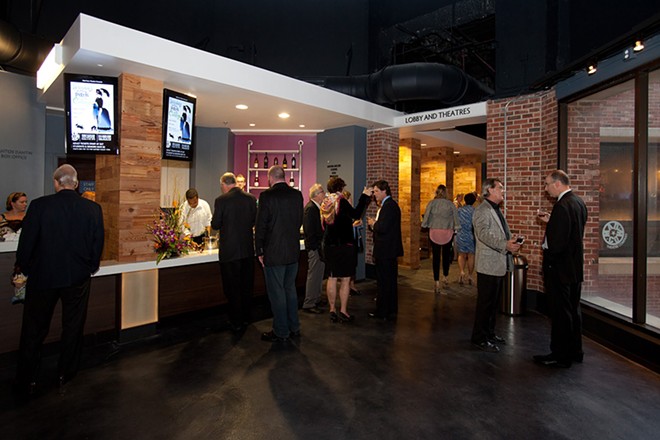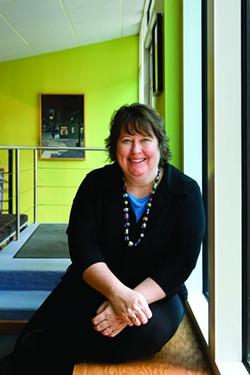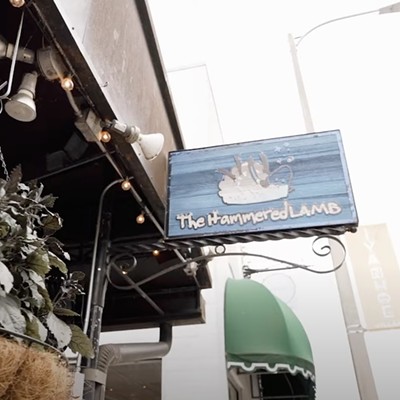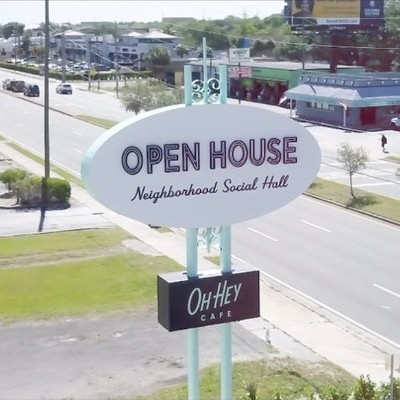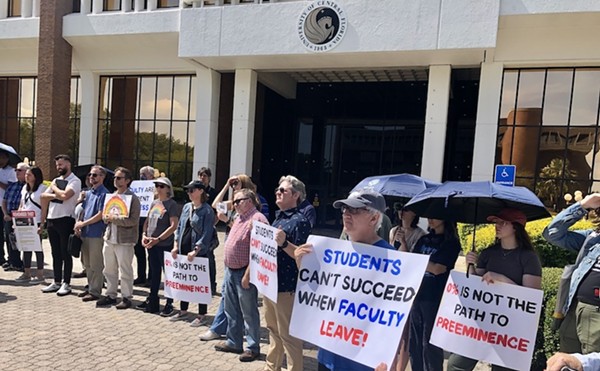More than two weeks ago, Aradhana Tiwari posted on social media what many in Orlando's local theater community knew as an open secret. "Attention: Must Be Paid," she wrote Sept. 24 on Facebook. "And so should artists for their services rendered."
The former resident director at Mad Cow Theatre alleged that over the past two years as an employee, the professional theater company had consistently fallen behind in paying her for her work, sometimes for weeks and even months. Before her employment started in 2014, Tiwari says Mad Cow owed her money from when she worked for them as an independent contractor, and two years later, they still hadn't paid.
"I'm an artist," Tiwari wrote. "It's not a hobby. It's my livelihood. When I'm not paid, there are consequences. Like you, I have a water bill, a cellphone bill – I even eat food. When we have an agreement for compensation an expectation is set. An expectation that I will get paid."
Such allegations might have sent shockwaves through a different theater community. But in Orlando, most artists reacted to Tiwari's post with a resigned "me too." In comment after comment, actors, stage managers, costume designers, technicians and former staff employees talked about delayed paychecks, paying for supplies for productions from their own pockets and being stiffed by the theater company.
"Been there, done that, had to sell the T-shirt," a commenter wrote.
At first, Mad Cow took the allegations in stride. After four days of silence, on Sept. 28 they posted a statement from the theater company's board of directors on their website saying Mad Cow owed back wages to a small number of artists primarily from the 2015-2016 season.
"During that season, Mad Cow Theatre paid more than $410,000 in wages to more than 225 artists over the course of 10 full productions, the Science Play Festival, the Orlando Cabaret Festival and special events," the statement read. "But we on the board of directors are sorry that payments to a few artists have fallen behind. We are taking immediate steps to correct that situation. While we have resolved the issue of payment with the person who brought this to our attention, we also are reaching out to the other affected artists directly and individually. We promise that we will pay those back wages in the near future on a schedule that we are in the process of creating."
But after paying Tiwari the money they owed her on Oct. 1 (three days after stating the matter was resolved), Mad Cow changed its tune. On Oct. 3, they posted a new statement from its board of directors, saying the nonprofit theater company was in debt but working to make it right, and that some of the information being circulated was false.
"In recent days, much has been said about Mad Cow Theatre's operations, with a good deal of information being misleading and inaccurate," the statement says. "Like most small theatre companies, we have had our share of challenges from time to time, including financial struggles. Due to the swell of interest and continued effort to misrepresent and possibly harm us, we seek to present the facts. This public discussion was started by a former employee, who had a legitimate issue that we addressed and resolved."
Neither of those statements seem to have stopped Tiwari and more than 100 people from signing a petition calling for a boycott of Mad Cow until it pays what it owes and holds itself accountable.
While some in the community argue Mad Cow's struggle has always been financial support, others say the decade-long pattern of delinquent payments is so embedded into the culture of the theater company that it's time for a big change.
When you ask artists why they decided to work for Mad Cow Theatre, time and time again – despite the company owing them money – they'll tell you a similar thing: Mad Cow was a treasure of the theater community, one of the few professional spaces in Orlando where you could stretch your talent in less commercial directions.
Starting in 1997 on a small budget in Maitland, Mad Cow Theatre grew over the years to produce musicals and plays like Dreamgirls, Death of a Salesman, Macbeth, Who's Afraid of Virginia Woolf?, Master Harold and the Boys, Avenue Q and, most recently, an all-female version of 1776 with a cast of 26 women.
When Tim Williams worked for Mad Cow as an Equity actor, starting in 2005, he didn't notice any irregularities with his paycheck. The Actors' Equity Association, a labor union that represents theater artists and stage managers, created the Orlando Area Theatre Contract, which, among other things, compels theaters in Orlando who hire Equity actors to pay them a salary on time and contribute to their health, disability and pension benefits.
But Williams says he noticed that when he wasn't working as an Equity actor, such as when he worked for Mad Cow teaching acting classes or as a freelance director, his checks would come in late – at one point, Mad Cow owed him more than $1,000.
At first, he thought the problem was Mad Cow renting a space that was too expensive, so of course money would be tight. But Williams says the delinquent payments continued even after the city of Orlando gave Mad Cow a new home base in 2011 – an 8,854-square-foot second-floor space at 54 W. Church St. with a rent-free 20-year lease agreement. After several years of hearing that non-Equity actors, set designers, stage managers and costumers were not being paid on time, and even seeing actors refuse to go on stage, Williams says he decided to talk to Mitzi Maxwell, Mad Cow's executive director.
"I was told by Mitzi whenever I brought these things up, I was always told it was under control, it's being taken care of, steps are being taken, they were trying to get more money," he says. "Once over drinks, she looked me straight in the face and said, 'We are so close to making this right. Don't listen to the noise.'"
But slowly, Williams says, he started losing faith. The situation finally came to a head during Venus in Fur in 2013 when Williams realized that his fellow actor and the stage manager were not being paid while he, as an Equity actor, was receiving consistent paychecks.
"I asked them, 'Are you two getting paid?'" Williams says. "And they told me, 'We haven't been paid for this show or the last show we did together two months ago.' It was demoralizing and awful to be handed a paycheck by [the stage manager] knowing she wasn't getting one."
When Maxwell asked for Williams' permission as an Equity actor (as required by the Equity contract) to extend the play, Williams says he told her he couldn't in good conscience let her extend the show when the theater still owed money to his co-actor and stage manager. Later, in a meeting about the situation, Williams says Maxwell thanked him for his contributions to Mad Cow, but told him it was none of his business how she ran the theater. Williams resigned.
"We want Mad Cow to survive," Williams says. "And as artists, we have a bad habit because we just want to work, even if we work for free, and so many actors here already have day jobs at the theme parks. People leave but if you still have a lot of actors showing up to auditions, people designing sets and donors still throwing money at it, it's not going to change."
Michael Marinaccio, an actor and producer of the Orlando Fringe Festival, had a similar experience to Williams. He was paid on time and in full for participating in plays like Master Harold and the Boys at the beginning of his association with Mad Cow, but as he began to get more involved in the company by teaching classes and directing shows, his paychecks were withheld starting in 2007.
When he finally left in 2011, Mad Cow owed him about $4,000, and he didn't receive that money until 2014, two days before the Orlando Sentinel interviewed him about the financial problems at Mad Cow. Mad Cow's lease with the city was rent-free but the theater company still had to pay monthly utility fees and monthly maintenance fees that in the third year of the lease totaled about $2,000. The Sentinel reported Mad Cow was "required to reimburse the city $480,000, plus 5 percent interest, for converting the space in the 54 West development into a theater." By 2014, Mad Cow was past due about $154,000, including interest, and artists it contracted told the Sentinel some of them waited four years to get the money they were owed, while some said they were "using personal funds to build sets for the theater's shows, or delaying the purchase of props while scrambling to find ways to pay for them."
"When I spoke to the Sentinel in 2014, they promptly started paying everyone they owed money to," he says. "I had thought, had hoped, that was the end of it, that we could put that terrible time behind us and Mad Cow could try to earn back the support of the community that it had lost."
Through the years, Marinaccio says again and again artists would tell him Mad Cow continued to pay them late or not pay them at all. After seeing Aradhana Tiwari's post on Facebook, he decided he couldn't be quiet any longer.
"One of the things that held me back over the years is I still love the theater I helped to build, the theater that helped make me the artist that I am," he says. "I didn't want it to go up in flames. ... I never told an artist not to work there. I tried to just stay out and hope that it would be corrected. I think that was naive and a little bit cowardly on my behalf, and I apologize to all the artists who were there because I helped enable that behavior."
Artists who have recently worked for Mad Cow have stories that mirror many of the experiences of Williams and Marinaccio. Actor Becky Eck says every single contract she's had with the company lapsed 90 days past the closing date of a show. Charles Hale and Donald Smith, two staff employees at Mad Cow who worked in production, say they both dealt with artists who constantly inquired about their paychecks. Orange County court records show that in 2012, Dahlquist Printing and Graphics, Inc. sued Mad Cow for not paying $827 for postcards. The case was later settled by both parties and ended up being voluntarily dismissed. Amanda Brumby, a costume designer, says she threatened legal action and even ransomed costumes she created for the production of The Dead until she was paid by Mad Cow.
"I have never, ever, in my 10 years of working in theater, been paid late by anyone other than Mad Cow," she says, a sentiment echoed by many of the artists Orlando Weekly interviewed. "I have also never been concerned that I was never going to be paid until I worked with Mad Cow."
Tiwari says she became Mad Cow's resident director in 2014 despite knowing about the allegations that artists were paid late and despite the fact that she was owed money from previous shows. Soon after starting her employment, her paychecks started to fall behind for months. It was hard to watch the many Equity actors included in shows get paid regularly while she and the rest of Mad Cow's staff fell behind. During her tenure there, Mad Cow would host fundraisers, once asking donors to give money for "health care for the artists," but Tiwari says that money never went to pay for health care for Mad Cow's staff.
"Some of us on staff weren't sure if the board of directors even knew what was going on," she says. "Every time we wanted to bring this up to them, we weren't allowed to email them, we were warned not to. In two years, we weren't asked or even allowed to go to one board meeting, and in my draft agreement, it says we're supposed to attend all meetings."
When she did get checks, Tiwari says she would get two or three checks at a time written for the correct pay period – once she even got an envelope full of them – and sometimes Mad Cow management would ask her not to cash her checks until a certain date.
"It's kind of like they were just dangling a carrot in front of us," she says. "All of it revolved based on where we were with a production. What they would spend on a play would affect whether or not you get paid that week."
After a little more than a year of frustration, Tiwari says she decided to resign and make an effort to get from Mad Cow the last $800 they owed her from two years ago. When she was ignored, she took to social media, setting off a discussion in the theater community that has evolved to include asking for a boycott against Mad Cow.
"I wish I had left sooner," Tiwari says. "When I wrote that letter on Facebook, I didn't have an agenda and I wasn't looking to take legal action. I just wanted to create stuff."
Orlando Weekly reached out to Maxwell and Mad Cow's board of directors and other employees to respond to these allegations, and received a response from Alvin Wang. Aside from being dean of the Burnett Honors College and a psychology professor at the University of Central Florida, Wang is also on the board of directors for Mad Cow Theatre.
Wang says the board is aware of artists' posting on social media and adds that Mad Cow needs to correct these late payments, an issue which the board finds "unacceptable" and has taken "very seriously and very deliberately," according to Wang. But, he says, there has been a "mischaracterization online" about what exactly the board knew about Mad Cow's payments.
"There is no question that Mad Cow has been late in payments," he says. "This has been going on for quite some time and it needs to stop. The [board] members will be the first to say that this was not right and it needs to be corrected as soon as we possibly can. Some of mischaracterizations really have to do with how the board operates and the sense that in some way, we're withholding payments or support because we can, because we're just kind of sloppy maybe, or we're not caring or not paying attention, and that isn't the case at all."
Wang says Mad Cow's board is working on a plan for late payments to be corrected as soon as possible. Wang also added that the extent to which there had been late payments for years was not fully revealed to the board until recently.
"We were kept apprised that we were typically one or two payments behind, which, to put that in terms of a bi-weekly salary, meant we were two to four weeks behind in payments," he says. "The two years that I've been on the board, we were told basically it was two to four weeks and it would be manageable. The board is still discovering right now the extent to which we need to basically make good on the money we owe to people. ... It was courageous for some of these artists to let this issue be known to us, because I'm not sure the board would have discovered otherwise."
Wang didn't answer a question about whether there would be any changes in Mad Cow's executive staff, but says the board of directors is looking at what expenses they can cut this season and in the theater's upcoming productions, yet maintain the production quality. He has heard about the petition for people to boycott Mad Cow until they are paid, and says that while he understands these sentiments, that would mean Mad Cow would have less revenue to start making payments.
"It's difficult because there's no fat to cut away here," he says. "In other words, we're not sitting on a nest egg. If we had the funds currently to pay everyone, we would do so. We don't have that funding. We're sorry that this has happened and people were put through this experience."
Wang says the board wants to see everyone paid and Mad Cow Theatre succeed.
"There have definitely been some financial and management issues that need to be corrected," he says. "But I hope everyone understands that ultimately our intention is to provide an uplifting and artistic vision to the Central Florida community, one which Mad Cow does very well in terms of the front end. We need to work on the back end process."
We also reached out to staff at the city of Orlando and the Orange County Division of Cultural Affairs. It wasn't easy to reach everyone due to Hurricane Matthew, but we did hear back from Cassandra Lafser, spokeswoman for Mayor Buddy Dyer, just before press time. Lafser confirmed that the City's funding agreement and lease with Mad Cow provides the space at 54 W. Church St. rent-free for 20 years, and that Mad Cow must reimburse the city for the theater buildout as well as a monthly Common Area Maintenance fee. "To date, they owe $85,058.48 in CAM fees and $245,000 in reimbursements that have not been paid, Lafser wrote in an email. Regarding the question of payments to artists, Lafser says, "The agreement does not address Mad Cow and their payment to their employees. That is a matter between Mad Cow and their employees."
So where is the money going at Mad Cow if not to its artists? Mad Cow's tax forms help paint a picture of what's going on at the theater company that's registered as a 501 (c)(3) public charity, according to Central Florida Foundation.
Mad Cow lists its mission statement as "the belief that the theatre is a dynamic and powerful means of social understanding, as well as a hugely entertaining art form. Through the combination of passionate, skillful acting and compelling, insightful writing, nurtured by an attentive and ever-changing process, Mad Cow presents entertaining works of theatre to an ever-widening audience – promoting, enhancing, and celebrating the human condition through art," according to the Central Florida Foundation.
In an audited financial statement ending on June 30, 2015, Mad Cow says it received $572,124 in grants and donations from the local community, including: $96,834 from the United Arts of Central Florida and its supporting organizations; $75,000 from Orange County; $204,193 from corporations, foundations and individuals; and $127,897 in "in-kind contributions" of professional services. The theater itself pulled in revenues of $420,256. But Mad Cow spent almost $1.4 million in production costs and other expenses, far outspending its total revenue.
Tiwari, Marinaccio and others say they often questioned why the theater put on 10 shows a year and hired Equity actors when it could not afford to pay everybody else on time. Tiwari says Maxwell told her not putting on those shows would be like the professional theater company taking a step back.
Mad Cow's 2015 audited financial statement says the theater company still owes the city's Community Redevelopment Agency $308,458. The CRA loaned Mad Cow $480,000 in 2011 for theater buildout costs, and while that money was due at the end of 2014, the financial statement says Mad Cow hasn't been able to pay due to "project cost overruns and related delays." The statement also adds that various board members and related family members had loaned Mad Cow money for a total of $165,275 by the middle of last year. According to 2014 tax returns, Jean Siegfried loaned the theater $7,000 in 2013/2014, of which $7,000 is still owed; Barbara Maxwell loaned $12,003 in 2010 and is owed $16,806; and Mitzi Maxwell made a loan of $80,664, also in 2010, with $141,469 now owed. Interest is accruing on these loans, but it's not clear if payments are actually going out.
In regards to the loans, Wang says "every board member has made a personal sacrifice in order to help with this issue."
Others have pointed out that it seems to be a conflict of interest to have Maxwell both as Mad Cow's executive director and as a treasurer on the board. Wang agrees, and says the board addressed the issue two months ago by asking Maxwell to step down from the position and appointing that responsibility to two other board members. Wang adds that the reason Maxwell held those positions despite the conflict is because Mad Cow is a small organization and finding people to do that kind of work is challenging.
Margot Knight, past president and CEO of United Arts of Central Florida, says she has a lot of respect for the work of Maxwell and others at Mad Cow for surviving in a financially hostile situation in regards to rent downtown. Knight says right before she left United Arts in 2011, she was contacted by several artists who complained about Mad Cow being late with payments. After speaking with Mad Cow's board, United Arts offered to loan Mad Cow money to resolve the issue, but Knight remembers Mad Cow told them they could handle the issue.
"It's a tough marketplace for arts and culture in Orlando, but it's still not an excuse to not pay artists," she says. "But it's irresponsible to imagine Mad Cow's demise. It's too important to the audience and to downtown."
Knight adds that she feels bad for everyone involved in the situation, including Maxwell, who has been the focus of online attacks.
"Some of the attacks Mitzi has been getting have been over the top," she says. "I think we should focus on the problem. I understand the frustration, but we need to make this about the process and remedying the situation, not about the people."
Martha Haynie, comptroller for Orange County, was selected to be on Mad Cow's board back when its financial issues became known to a wider audience in 2014. Haynie says she has since stepped down from the position because Mad Cow simply needed more attention than she could give.
"I knew that they had some big problems and if I stayed onboard, it would be my responsibility to fix them," she says. "But I didn't have the time or energy, and I don't like to just be a name on the letterhead."
"It's important to pay people for what they do," she says. "Artists have to feed their children and pay rent, too. As this community celebrates its beautiful cultural facilities, we need to pay attention to the incredible local talent that we've got and nurture them as well."
In a final Facebook post on Oct. 4, Tiwari says the Mad Cow Theatre family is a tribe that needs to support the artists who are telling their stories about delinquent payments.
"I get that many of you are upset with me," she writes. "I may be sacrificing my friendship with some of you by saying the following, but family tells the truth to each other. Even when it's inconvenient. Even when it's impolite."
We heard back from Terry Olson, director of Orange County Arts and Cultural Affairs, the day after our print deadline. He had this to say: "Orange County is concerned that the operations of all the organizations in which we invest are sustainable, and that they continue to produce quality performances and exhibitions that help elevate the status of Central Florida’s arts and cultural affairs to that befitting a world-class community."


